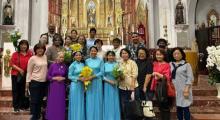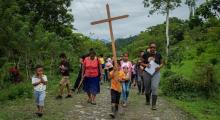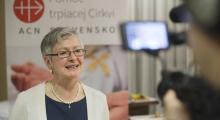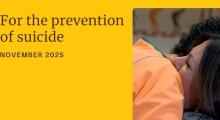Issued by the Catholic Center for Studies and Media - Jordan. Editor-in-chief Fr. Rif'at Bader - موقع أبونا abouna.org
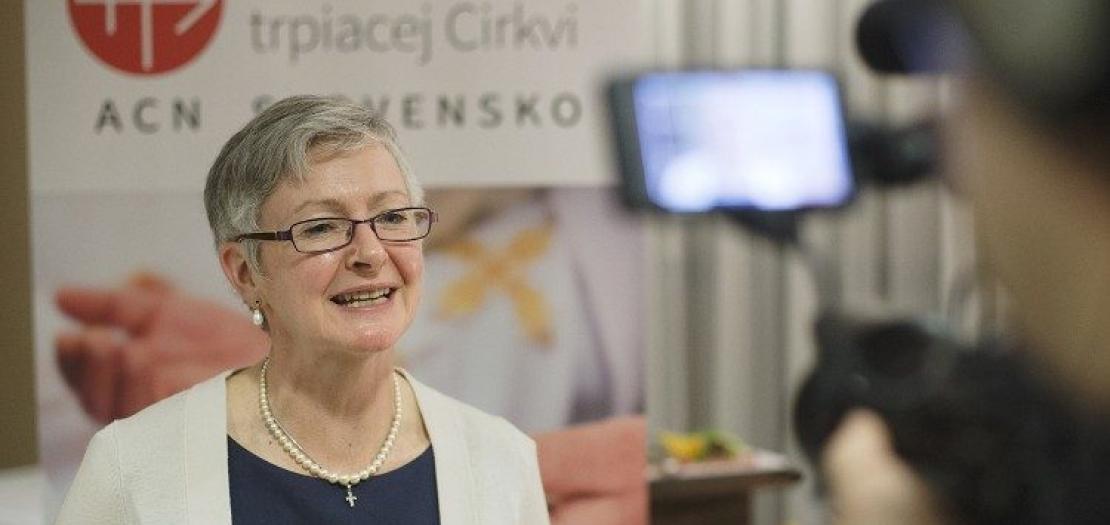
Speaking with Vatican News, Regina Lynch—Executive President of the international organization Aid to the Church in Need (ACN International)—reflects on the Christians in Pakistan who embrace their suffering by saying they are nothing compared to the suffering of Christ; as well as the more than 5,500 aid projects run by her organization, and Pope Leo XIV’s words that resonate even with people of other faiths.
Many causes behind religious persecution
The ACN executive president emphasizes that religious persecution today is far more widespread than in the past. One reason, she explains, is the growing number of authoritarian governments that seek to control their societies—a task made easier by modern technology. In addition, the world has seen a rise in jihadism since the attacks of September 11, 2001, with followers of many faiths counted among its victims.
Extraordinary testimonies of the persecuted
As Lynch travels to various regions to assess local conditions and develop ACN projects, she hears powerful messages from local communities and is deeply inspired by the faith of the Catholics she meets. “Sometimes they know that they may pay the ultimate price, and yet they remain strong in their faith,” she explains.
She recalls in particular her encounters in Pakistan, where Christians form a small and impoverished minority. “These simple people told me that Christ suffered so much more than they ever could, and so they see their own suffering as nothing compared to His,” she recounts.
Letting the world know they are not forgotten
According to Lynch, one of ACN’s urgent tasks is to raise global awareness about religious persecution. “I remember traveling with Pope Francis to Iraq in March 2021,” she says. “When I told some Catholic friends where I was going, they looked at me rather puzzled and said, ‘Why Iraq? That’s a Muslim country!’ They didn’t know that there have been Christians since the early days of the Church.”
She stresses the power of prayer and solidarity: “When I am in northern Nigeria or other areas that have suffered horrific atrocities, I see how much it means for people to know they are not alone. They understand that we represent people from faraway places who are praying for them. That gives them tremendous strength and hope, reminding them that they belong to the one Body of Christ—a profound source of comfort.”
5,500 aid projects worldwide
ACN’s work includes concrete projects funded entirely by private donations, without government or public support. Among the roughly 5,500 ongoing initiatives are missionary efforts in impoverished regions where the Church lacks resources to build churches or seminaries, or to provide formation for sisters and catechists. The organization also supports biblical, educational, and pastoral programs that nurture faith.
In regions where Christians face extreme persecution, ACN provides emergency assistance.
Aid for Syria, Iraq, and Ukraine
Since 2011, Aid to the Church in Need has been continuously helping in Syria, where the remaining Christians are impoverished and struggling to survive, especially during the harsh winters. The organization provides housing, funds schools, supplies powdered milk for infants, and organizes activities for children.
In Iraq, ACN supports the Catholic University of Erbil in the Chaldean Archdiocese by providing scholarships for young Christians pursuing studies in law, engineering, architecture, and other fields.
“In Ukraine, we train priests and religious sisters so they can accompany their faithful,” Lynch adds. “There are also many priests serving as chaplains on the front lines who need help and post-traumatic treatment.”
A global petition for religious freedom
ACN launched a worldwide petition to defend Article 18 of the Universal Declaration of Human Rights, which guarantees freedom of religion.
“This is a crucial issue,” Lynch emphasizes. “Religious freedom is a human right, not a privilege. It’s only when people realize that this right is no longer being considered that they begin to act. That’s why it’s so important for as many people as possible to sign the petition—it’s about our future, and the future of our children.”
The ACN executive president recalls Pope Leo XIV’s words linking peace and religious freedom: “When people are deprived of these rights, society begins to move toward dictatorship and authoritarianism,” she warns.
Strong support from the Pope
Lynch emphasizes the importance of the Pope’s constant appeals for respect for religious freedom, dialogue, and bridge-building.
“We are deeply grateful to the Pope for speaking out so often, because people look to him—even those who are not believers or Christians—and they hold him in great esteem. We saw the same commitment during the pontificate of Pope Francis, who strongly supported this cause. It is deeply encouraging to see Pope Leo continuing along this path,” she says.
She also highlights the Pope’s global influence: “Just look at how many world leaders visit him in the Vatican. He truly serves as a point of reference for so many people and governments. When he speaks on these issues, it carries enormous weight.”
Lynch expresses her gratitude for Pope Leo’s audience with ACN representatives in early October. During the meeting, she presented him with an icon painted in Aleppo on wood salvaged from the ruins of a Maronite cathedral. “As I handed the icon to the Pope, I told him its story and where it came from. I could see that he was truly listening—and visibly moved,” she recalls.
“There’s a remarkable sense of serenity that radiates from him, even though he carries the burdens of the world on his shoulders. I believe we are truly blessed to have Pope Leo,” Lynch shares.
The crucial role of the media
Finally, she emphasizes the vital role of the media in raising awareness about these issues.
“It’s important to share positive stories, but also to report on people’s suffering,” Lynch explains. “The more people understand the reality we are living in, the more likely they are to take action.”


